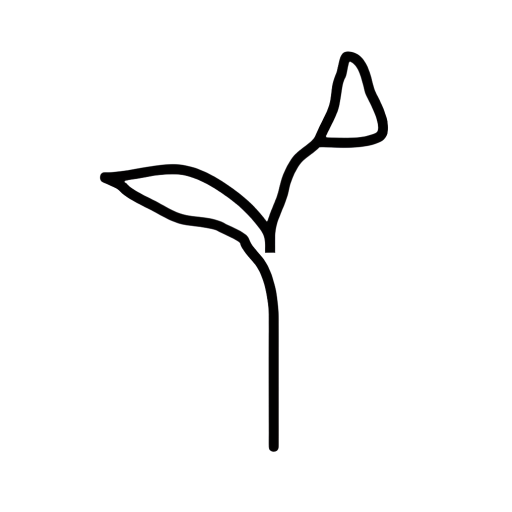Mindful Sudoku
Daily Mindfulness Journal + Sudoku Puzzles
Daily Mindfulness Journal + Sudoku Puzzles
Couldn't load pickup availability
What is Mindful Sudoku?
Our thoughtfully crafted journal brings together the joy of Sudoku puzzle-solving with mindful reflection, creating a peaceful practice for both mind and spirit.
Sudoku becomes a powerful mindfulness tool when played with intention. Each puzzle is thoughtfully paired with a mindfulness prompt, transforming a simple game into a meditative experience.
Engage, reflect, and find moments of calm in your daily routine.
What's Inside
- 60 sudoku puzzles
- 60 mindfulness prompts
- 60 free write pages for reflection
- Easy-to-read with one puzzle per page
- Complete answer key included
- 2+ months of daily mindfulness
- Perfect for all skill levels (beginner, intermediate, advanced)
For bulk orders, contact hello@mindfulsudoku.com.
- Less Stress
- Daily Peace
- Clear Mind
Share
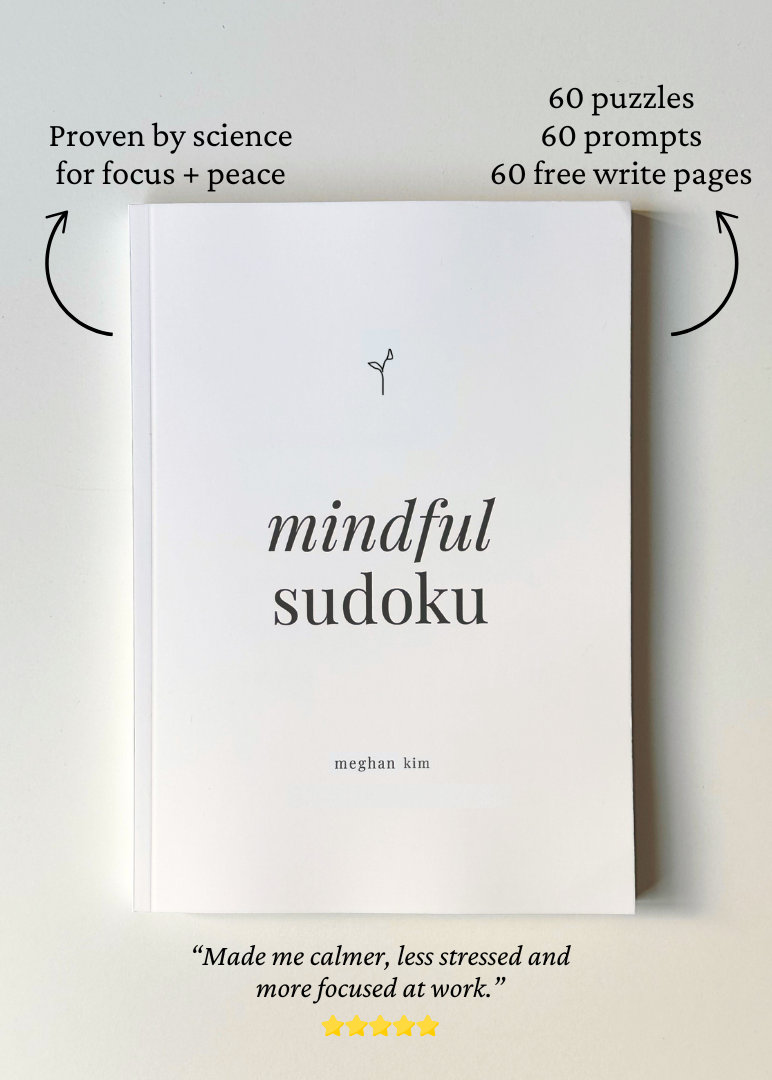
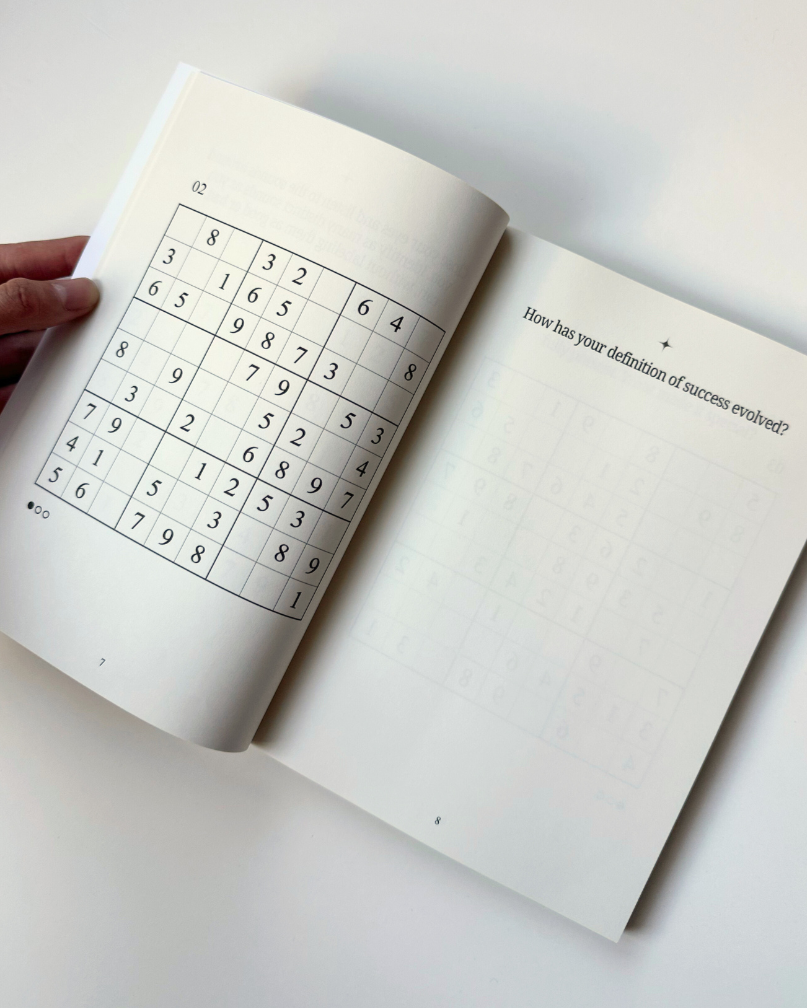
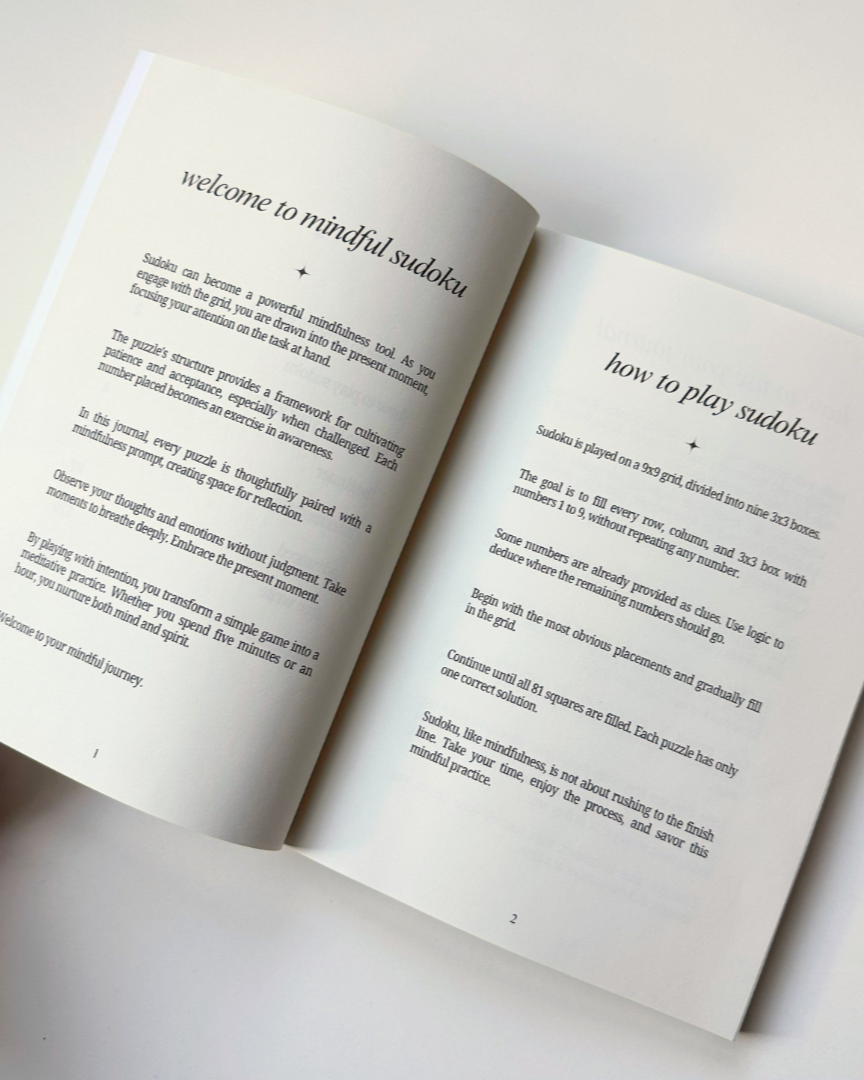
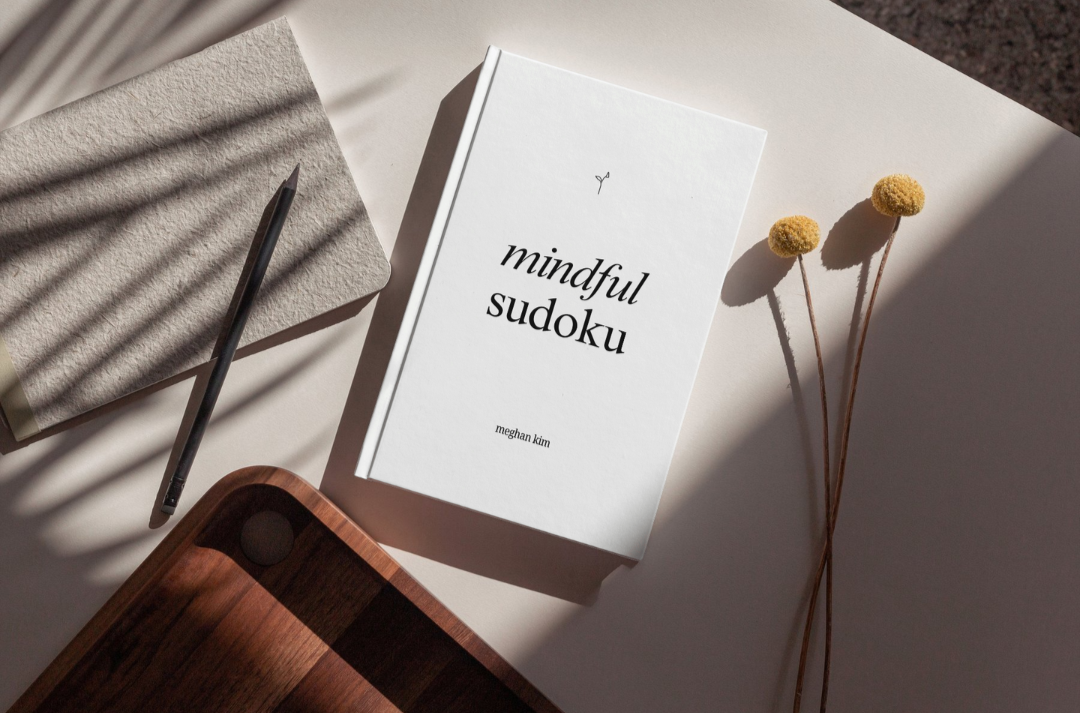
FAQs
How does Mindful Sudoku cultivate mindfulness?
Our Mindful Sudoku approach aims to make mindfulness more accessible, enjoyable and effective for a wider audience of people seeking greater calm and clarity in their daily lives.
- Transform puzzle-solving into meditation
- Build a sustainable mindfulness practice
- Create moments of calm in your busy day
- Progress at your own pace
- Combines the cognitive benefits of puzzle-solving with the proven stress-reducing effects of mindfulness practice
Sudoku naturally encourages focus and presence, making it an ideal gateway to mindfulness. The combination of puzzle-solving with gentle awareness prompts helps you practice mindfulness in an engaging, structured way. It's particularly helpful for people who find traditional meditation challenging or want a more active approach to mindfulness.
What is the history of mindfulness?
The practice of mindfulness, or being fully present and aware moment-to-moment, has ancient roots in Eastern spiritual traditions, especially Buddhism. The term itself comes from the Pali word "sati", referring to key qualities of awareness, attention, and remembering in Buddhist teachings.
The earliest records of mindfulness practice date back to around 500 BCE in the Satipatthana Sutta, a foundational Buddhist text. This discourse outlines four key applications of mindfulness: to the body, feelings, mind, and mental phenomena. These establish the basis for the various mindfulness practices we know today.
As Buddhism spread across Asia over centuries, different schools like Zen, Tibetan Buddhism and Theravada developed their own unique expressions and techniques of mindfulness. Yet they all maintain the core principles of cultivating present-moment awareness and observing one's inner experience without judgment.
In the 20th century, Vietnamese Zen teacher Thich Nhat Hanh was instrumental in bringing mindfulness to a global audience. Thay, as he's known, made ancient Buddhist practices accessible and relevant to modern life. He emphasized integrating mindfulness into daily activities through simple yet profound methods like mindful breathing and walking. Thay's teachings highlight how mindfulness cultivates not only personal well-being, but also compassion, interconnection and engaged action in the world.
Today, mindfulness has spread far beyond its Buddhist roots to become a global phenomenon. Its history reveals a timeless human need to live with greater presence, wisdom and compassion - a powerful antidote to the challenges of the modern world. By understanding mindfulness' rich past, we can better appreciate its profound potential for transforming our present.
What is the science behind mindfulness?
In recent decades, scientists have increasingly studied the effects of mindfulness on mental and physical health. Research indicates that practicing mindfulness - paying attention to the present moment with openness and non-judgment - can lead to significant benefits for well-being.
Studies have found mindfulness to be effective at reducing stress, anxiety and depression. Evidence also suggests it can boost positive emotions, emotional regulation, and overall quality of life. One key development was the creation of Mindfulness-Based Stress Reduction (MBSR) in the 1970s, an eight-week program teaching mindfulness to help people manage stress and chronic pain. MBSR has been extensively researched, demonstrating broad mental and physical health benefits.
Neuroscience research is beginning to uncover how mindfulness changes the brain. Studies show it can alter brain structure and function in regions involved in learning, memory, emotion regulation and perspective-taking, while reducing activity in areas associated with stress and mind-wandering.
Mindfulness also shows promise for physical health, with potential benefits for blood pressure, immune function, and sleep. It is increasingly used as a complementary approach in treating conditions like chronic pain, heart disease and gastrointestinal disorders.
A growing body of evidence points to the potential of mindfulness as a powerful tool for promoting human health and flourishing. By integrating ancient contemplative wisdom with modern research, we are discovering new ways to cultivate well-being and resilience in the face of life's challenges.
Who is this for?
- Mindfulness beginners wanting a practical approach
- Sudoku puzzle lovers looking to deepen their practice
- Anyone who finds traditional meditation challenging
- Busy professionals seeking a mindful break
- Parents and caregivers seeking moments of calm
- Thoughtful gift-givers seeking unique presents
- Those who live on autopilot
What are the dimensions?
More product details:
- 5.83 x 8.27 inches
- 204 pages
- Paperback
What is your return policy?
For items that arrive damaged or defective, we offer refunds or replacements. You have 30 days after receiving your item to request a refund or replacement. Contact hello@mindfulsudoku.com for support.
This journal is so amazing! As somebody who has been struggling to get into journaling this is an amazing start! I love the challenge of sudoku and being able to release on paper with each prompt. Such a variety of different prompts that makes this not feel too heavy and helps to be achievable!
This is useful when I don’t think I have time or patience for a “full on” journal entry. The sudoku puzzle primes my writing focus and I am able to answer the prompt right after with little preparation. Very useful during and after a full day.
i love this book :-)) so relaxing while allowing me to look inward at the same time
such an amazing concept for a journal! i love sudoku and have been trying into journaling daily so this was perfect !!!
I ordered one for me and as a gift for a friend. We are both having a great time learning sudoku and have throughly enjoyed the journal prompts that go along with the squares. I’m really glad I purchased this!
